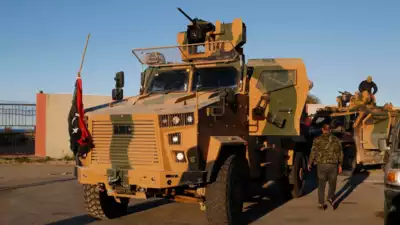
The United Nations has expressed concern regarding the armed mobilization in Libya
Reports of the mobilization of forces in Tripoli and threats of force to resolve a crisis over control of the central bank prompted the United Nations Libya mission to express concern late on Thursday.
On Monday, Stephanie Koury, the deputy director of the mission, informed the U.N. Security Council that the political and military conditions in Libya had deteriorated rapidly over the past two months, which included a series of mobilizations by armed factions.
The mission stated in its Thursday statement that the lives and security of civilians are at risk due to the display of military power and armed confrontations in densely populated communities.
After political factions attempted to remove Sadiq al-Kabir as the head of the Central Bank of Libya (CBL), the most recent round of tensions erupted, with rival armed factions mobilizing on either side.
Mohammed al-Shokri, the individual who was proposed as Kabir’s replacement governor, issued a statement on Friday indicating that he would only accept the position if both of the country’s competing legislative bodies supported him.
Libya, a significant oil producer on the Mediterranean, has experienced minimal stability since a 2011 insurrection that was supported by NATO. In 2014, the nation was divided between opposing eastern and western factions, which ultimately attracted the support of Russia and Turkey.
In 2020, a ceasefire was implemented to temporarily halt the main fighting. However, the political crisis has yet to be resolved, resulting in the persistence of major factions, who occasionally engage in armed conflicts and vie for control over Libya’s substantial economic resources.
The political leaders of the nation are selected from bodies that were elected a decade or more ago or installed during periodic international peacemaking efforts to supervise repeated failed transitions. The diplomatic effort to supplant all of Libya’s political bodies with national elections has been halted.
The Libyan National Army (LNA) of commander Khalifa Haftar controls Eastern Libya, where the parliament is located.
Rival armed factions have engaged in repeated conflicts in Tripoli and the northwest, the locations of the internationally recognized Government of National Unity (GNU) and the majority of key state institutions.
The LNA deployed a force into southwest Libya in late July and early August, which raised concerns about the possibility of east-west fighting. Meanwhile, rival factions in northwest Libya mobilized against one another.
In the interim, the House of Representatives parliament, which is situated in the eastern region, has also reiterated its call to remove the GNU and Presidency Council. In addition, the High State Council, which is one of the internationally recognized legislative bodies, is currently in a state of impasse following a contentious vote regarding its leadership.
The parliament rejected the decision by Presidency Council chief Mohammed al-Menfi to replace Kabir and the board, which exacerbated tensions regarding control of the central bank.
All Categories
Recent Posts
Tags
+13162306000
zoneyetu@yahoo.com



